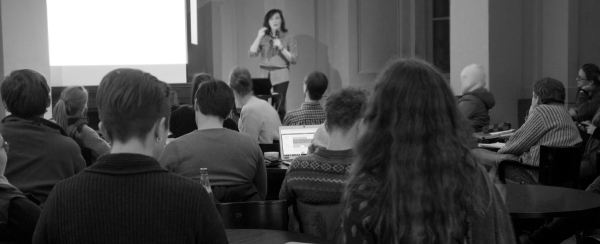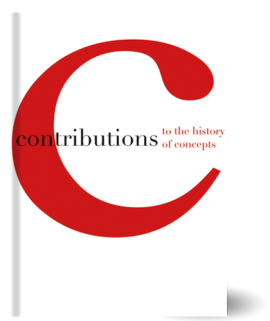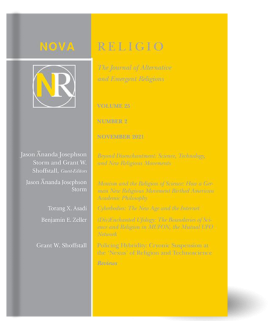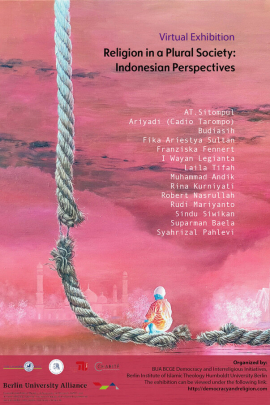
|
Wednesday Weekly 3 November 2021
|
|
|
|
|
Dear friends and colleagues,
Today, our workshop on “Religion as an Object of Historical and Social Scientific Study: Global Perspectives” started. Until 5 November you still have the chance to participate online. If you are interested, please send us an e-mail.
In this Wednesday Weekly, we also present two new publications, a job opportunity and a virtual exhibition.
Enjoy and have a great week!
Anja & Lucy
|
|
|

|
KFG-Workshop “Religion as an Object of Historical and Social Scientific Study: Global Perspectives”, 3–5 November More Information
Registration for online participation
|
|
|
|
|
New Publication I: Florian Zemmin on “Conceptual History of the Near East. The Sattelzeit as a Heuristic Tool for Interrogating the Formation of a Multilayered Modernity. We would like to mention a new publication by our Associate Member Florian Zemmin. In the latest issue of the journal Contributions to the History of Concepts he and his co-author Henning Sievert discuss the conceptual formation of modernity in Arabic and Turkish as a multilayered process, involving both ruptures and continuities, intersecting various temporalities, and incorporating concepts from several languages. To interrogate this multilayered process, they suggest the metaphor of the Sattelzeit (Saddle Period) as a heuristic tool, precisely because of its being tied to modernity. The article also shows what conceptual history of the Near East has to offer to conceptual history more broadly.
Zemmin, Florian and Henning Sievert. “Conceptual History of the Near East. The Sattelzeit as a Heuristic Tool for Interrogating the Formation of a Multilayered Modernity.” Contributions to the History of Concepts 16, no. 2 (2021): 1-26.
Read Full Article
|
|
|
|
|
|
|
New Publication II: Jason Ānanda Josephson Storm on “Monism and the Religion of Science. How a German New Religious Movement Birthed American Academic Philosophy”We also would like to draw your attention to the latest publication by our Senior Research Fellow Jason Ānanda Josephson-Storm on “Monism and the Religion of Science”, for which most of the research was done during Jason’s stay at KFG in 2019/2020. In his article he traces the genesis of the German Monist League and how it was transplanted to the United States by the publisher, Paul Carus. Jason emphasizes the surprising fact that Monism had followers with significant scientific renown including multiple Nobel Prize-winning scientists, famous philosophers of science, and even a celebrated sociologist. He shows how Ernst Haeckel, who founded the early twentieth-century new religious movement and his followers constructed a hybrid Scientific Faith or Secular Church that this article demonstrates went on to provide the foundation for professionalizing American philosophy.
Storm, Jason Ānanda Josephson. “Monism and the Religion of Science.” Nova Religio 25, no. 2 (2021): 12–39.
Read Full Article
|
|
|
|
|

|
Job Opportunity: Assistant Professor in Early Modern Mediterranean Religion We would like to forward a current job opportunity that might be of interest for you: The Department of Religious Studies at Northwestern University, invites applications for a full-time, tenure-track appointment at the rank of Assistant Professor for a specialist in Mediterranean religion in a transregional and/or transatlantic frame. The successful candidate will be interested in the varied routes of religious, philosophical, and material exchange connecting Europe, the Middle East, North Africa and/or the Americas from 1500-1800 and may specialize in Christianity, Islam, and/or Judaism.
The position begins 1 September 2022.
Application Deadline: 15 November
|
|
|
|
|
Virtual Exhibition: Religion in a Plural Society: Indonesian PerspectivesOur Research Coordinator Johannes Duschka points to an interesting virtual exhibition which is part of the Democracy and Interfaith Initiatives, an interdisciplinary project which discusses the conditions under which religious and political education can strengthen democracy. The project is dedicated to making Indonesian perspectives visible, bringing scholars and practitioners working in Germany and Indonesia together. The artistic process can be viewed as part of the religious/spiritual belief practice of artists. As such, artists have the potential to take part in shaping the representation of religion or belief and religious practice in the public sphere. 14 established Indonesian artists were invited to create artworks considering the key question “What place is there for belief and religious practice in a plural society?”
The exhibition is organized and curated by Claudia Seise from the Berlin Institute for Islamic Theology at Humboldt University Berlin.
|
|
|
|
|
|
If you have any content that you think suits the purpose of the weekly, please feel free to send it to us at multiple-secularities@uni-leipzig.de. |
|
|





